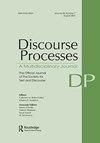Developmental differences in children’s generation of knowledge-based inferences
IF 2.1
2区 心理学
Q2 PSYCHOLOGY, EDUCATIONAL
引用次数: 0
Abstract
ABSTRACT We examined knowledge-based inference in 6-, 8- and 10-year-olds. Participants listened to texts where the number of clues for an inference was manipulated and then judged whether single-word probes (target inference, competing inference, literal word from the text and an unrelated concept) were related to the story. Accuracy and response times were analyzed with mixed-effects models. Inference accuracy was higher with three clues, and older children responded to the inference more accurately and quickly than younger children. The inference and literal probes were compared: 10-year-olds responded more accurately and quickly to the inference; however, 6-year-olds were more accurate for the literal. We propose that by 10-years of age, children are able to activate knowledge-based inferences while listening to text. All age groups had some inhibition difficulty, with less accurate and slower responses for the competing inference than the unrelated concept. Inference instruction should be sensitive to developmental differences in inferential processing.儿童知识推理生成的发展差异
摘要:我们研究了6岁、8岁和10岁儿童的基于知识的推理。参与者听文本,其中推理的线索数量被操纵,然后判断单个单词的探针(目标推理、竞争推理、文本中的字面单词和一个不相关的概念)是否与故事有关。使用混合效应模型分析准确度和响应时间。三条线索的推理准确率更高,年龄较大的儿童对推理的反应比年龄较小的儿童更准确、更快。对推理和字面调查进行了比较:10岁的人对推理的反应更准确、更快;然而,6岁的孩子在字面上更准确。我们建议,到10岁时,孩子们能够在听课文时激活基于知识的推理。所有年龄组都有一些抑制困难,对竞争推理的反应不如对无关概念的反应准确和缓慢。推理教学应该对推理过程中的发展差异保持敏感。
本文章由计算机程序翻译,如有差异,请以英文原文为准。
求助全文
约1分钟内获得全文
求助全文
来源期刊

Discourse Processes
Multiple-
CiteScore
4.30
自引率
4.50%
发文量
27
期刊介绍:
Discourse Processes is a multidisciplinary journal providing a forum for cross-fertilization of ideas from diverse disciplines sharing a common interest in discourse--prose comprehension and recall, dialogue analysis, text grammar construction, computer simulation of natural language, cross-cultural comparisons of communicative competence, or related topics. The problems posed by multisentence contexts and the methods required to investigate them, although not always unique to discourse, are sufficiently distinct so as to require an organized mode of scientific interaction made possible through the journal.
 求助内容:
求助内容: 应助结果提醒方式:
应助结果提醒方式:


